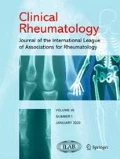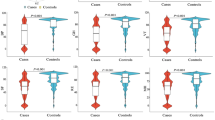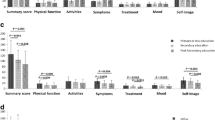Abstract
The objective of this study was to examine health-related quality of life (HRQOL) and social support in patients with systemic lupus erythematosus (SLE) and compare it with healthy people, to identify the relationship between social support and HRQOL in SLE patients, and to assess the influence of age, SLE Disease Activity Index (SLEDAI) and disease duration on HRQOL. We administered The Medical Outcomes Study Short Form-36 (MOS SF-36) questionnaire and the Social Support Rate Scale (SSRS) to a group of 202 patients with SLE and a healthy control group of 207 individuals. Spearman correlation was performed to identify the relationship between social support and HRQOL in SLE patients. The ordinal regression analyses were used to identify independent variables that were associated with the PCS and MCS. Results show that the physical (PCS) and mental (MCS) component summary scores of MOS SF-36 were lower in patients compared with healthy controls. Patients with SLE have a poorer social support as compared with healthy controls in subjective support, objective support, and availability of support. There was a positive correlation between social support and PCS and MCS. MCS and PCS were negatively associated with age and SLEDAI. MCS were negatively associated with disease duration. Taken together, this data suggested that patients with SLE have significant impairment of their HRQOL and less social support. HRQOL may be affected by social support, age, and SLEDAI.
Similar content being viewed by others
References
D’Cruz DP, Khamashta MA, Hughes GRV (2007) Systemic lupus erythematosus. Lancet 369:587–589
Bertoli AM, Alarcon GS, McGwin G Jr (2006) LUMINA Study Group. Systemic lupus erythematosus in a multiethnic U.S. cohort (LUMINA) XXVII: factors predictive of a decline to low levels of disease activity. Lupus 15:13–18
Guyatt GH, Feeny DH, Patrick DL (1993) Measuring health-related quality of life. Ann Intern Med 118:622–629
Whoqol Group (The) (1993) Study protocol for the World Health Organisation project to develop a quality if life assessment instrument (Whoqol). Qual Life Res 2:153–159
Ware JE Jr, Sherbourne CD (1992) The MOS 36-item short form health survey (SF-36): I. Conceptual framework and item selection. Med Care 30:473–483
The World Health Organization Quality of Life assessment (WHOQOL): position paper from the World Health Organization. Soc Sci Med 41:1403–1409
Cobb S (1976) Social support as a moderator of life stress. Psychosom Med 38:300–314
Decker CL (2007) Social support and adolescent cancer survivors: A review of the literature. Psycho-Oncol 16:1–11
Uchino BN (2006) Social support and health: a review of physiological processes potentially underlying links to disease outcomes. J Behav Med 29:377–387
Alarcón GS, McGwin G Jr, Uribe A et al (2004) Systemic lupus erythematosus in a multiethnic lupus cohort (LUMINA). XVII. Predictors of self-reported health related quality of life early in disease course. Arthritis Care Res 51:465–474
Rinaldi S, Doria A, Salaffi F et al (2004) Health-related quality of life in Italian patients with systemic lupus erythematosus. I. Relationship between physical and mental dimension and impact of age. Rheumatology 43:1574–1579
Abu-Shakra M, Keren A, Livshitz I et al (2006) Sense of coherence and its impact on quality of life of patients with systemic lupus erythematosus. Lupus 15:32–37
Khanna S, Pal H, Pandey RM, Handa R (2004) The relationship between disease activity and quality of life in systemic lupus erythematosus. Rheumatology 43:1536–1154
Hochberg MC (1997) Updating the American College of Rheumatology revised criteria for the classification of systemic lupus erythematosus. Arthritis Rheum 40:1725
Tan EM, Cohen AS, Fries JF et al (1982) The 1982 revised criteria for the classification of systemic lupus erythematosus. Arthritis Rheum 25:1271–1277
Ware JE, Snow KK, Kosonski M et al (1993) SF-36 Health survey manual and interpretation guide. The Health Institute, New England Medical Center, Boston
Xiao SY (1993) The social support rate scale. Chinese Journal of Psychology 7(Suppl):42–46
Bombardier C, Gladman DD, Urowitz MB et al (1992) The Committee on Prognosis Studies in SLE. Derivation of the SLEDAI: a disease activity index for lupus patients. Arthritis Rheum 35:630–640
Chaojie L, NingXiu L, Xiaohui R et al (2001) Feasibility of using short Form 36 in Chinese population. J West China Univ Med Sci 32:39–42
Kozora E, Ellison MC, Waxmonsky JA et al (2005) Major life stress, coping styles, and social support in relation to psychological distress in patients with systemic lupus erythematosus. Lupus 14:363–372
Karlson EW, Daltroy LH, Lew RA et al (1997) The relationship of socioeconomic status, race, and modifiable risk factors to outcomes in patients with systemic lupus erythematosus. Arthritis Rheum 40:47–56
Sutcliffe N, Clarke AE, Levinton C et al (1999) Associates of health status in patients with systemic lupus erythematosus. J Rheumatol 26:2352–2356
Vyavaharkar M, Moneyham L, Tavakoli A et al (2007) Social support, coping, and medication adherence among HIV-positive women with depression living in rural areas of the southeastern United States. Aids Patient Care and STDs 21:667–680
Wang C, Mayo NE, Fortin PR (2001) The relationship between health related quality of life and disease activity and damage in systemic lupus erythematosus. J Rheumatol 28:525–532
Acknowledgments
This work was supported by grants from the National Natural Science Foundation of China (30571608, 30771848) and the Specialized Research Fund for the Doctoral Program of Higher Education of China (20070366002).
Disclosures
None.
Author information
Authors and Affiliations
Corresponding author
Rights and permissions
About this article
Cite this article
Zheng, Y., Ye, DQ., Pan, HF. et al. Influence of social support on health-related quality of life in patients with systemic lupus erythematosus. Clin Rheumatol 28, 265–269 (2009). https://doi.org/10.1007/s10067-008-1033-7
Received:
Revised:
Accepted:
Published:
Issue Date:
DOI: https://doi.org/10.1007/s10067-008-1033-7




